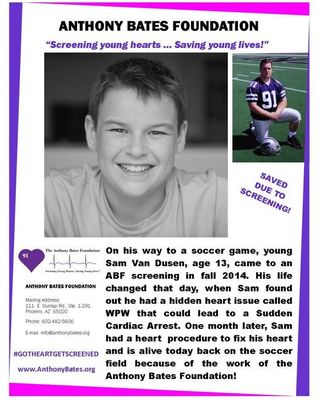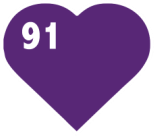
The ECG was invented in the late 1800s. It’s the machine that displays the squiggly lines, and always flatlines in TV dramas. It is used to detect abnormal heart rhythms and diagnose electrical conditions and heart attacks. It is also a good indicator for certain structural conditions. It is a very useful piece of equipment, but not all ECGs are created equal.
Most ECGs found in a doctor’s office or hospitals have 12 leads and allow you to conduct a reading at multiple points throughout the body. The Apple Watch is a one lead ECG so it monitors the heart rhythm from one spot on the body. This technology shows lots of promise, but it does not collect enough detail to diagnose heart conditions . . . yet.
Why does this matter? Sudden cardiac arrest is the leading cause of death of adults in the United States. It is the #1 cause of death of student athletes and takes the lives of thousands of children every year. Eighteen years ago, my son, Anthony, became one of those statistics. The Anthony Bates Foundation was created to raise awareness about heart disease and sudden cardiac arrest in children as well as create a heart screening program accessible to students and families. Let me offer this real-life scenario to illustrate my point.
Sam is thirteen. He complains that his heart races. It is hard to know what this really means because Sam is the only one who feels his symptoms. Does Sam consume too much caffeine? Is he an anxious kid? Does he have a heart condition?
Sam comes to one of our screening days in the fall 2014. After getting an ECG (12 lead), he is diagnosed with Wolff Parkinson White Syndrome - an electrical condition the can often lead to sudden cardia arrest. It is possible that the new Apple Watch would have recorded his racing heart. This would’ve provided his parents and doctor with clues about his complaints. It could have led to further testing, the 12 lead ECG, to diagnose his condition. In other words, the watch could have taken the ambiguity out of Sam’s description.
Following his diagnosis, Sam underwent a medical procedure called an ablation (right after my son’s 14th AngelDay. Coincidence?). Now, Sam is completely healthy and doing well in high school and in the band.
We should celebrate this new advancement for what it is. It brings affordable medical technology into our homes. It empowers consumers with valuable information. It raises awareness about heart health. It will give our children insight into how hard their heart works every day. It will help them understand how their heart behaves in certain situations. There’s no doubt that this will lead to a better quality of life.
In the meantime, get your child’s heart screened. Check Out our heart screening calendar on AZ & KS. And our friends at Simon's Heart have a national list, too! Check Out their list! A heart screening could save a child's life. Like Sam & many others!

 RSS Feed
RSS Feed